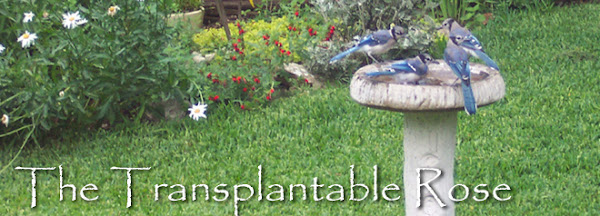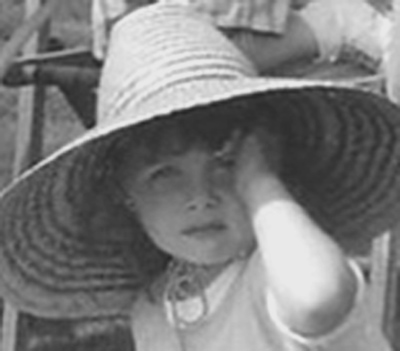This post, Still Posting After All These Years, was written by Annie in Austin for her Transplantable Rose blog

The
Transplantable Rose turned eight years old last week. Eight years is long
enough for two presidential terms. Eight years covers all the grades in an
old-fashioned grammar school, and is also long enough to change a 13-year-old
child into a fully-fledged, 21-year-old adult.
Did my blog change in eight years? The format changed as Blogger evolved but that’s about all.
Did my blog change in eight years? The format changed as Blogger evolved but that’s about all.
But
blogging did change something in this blogger’s mind and habits.
Before the Transplantable Rose ever started I
took a reasonable number of garden photos, sometimes emailing them to family
& friends in other states. After joining millions of other people and
starting the blog on June 7, 2006, I took more photos, sometimes with a specific
post in mind… sometimes “just in case”. Beginning in February 2007, there were a
disproportionate number of photos taken around the 15th of each month due to
May Dreams Carol and her Garden Blogger Bloom Day meme.
The
number of posts on the Transplantable Rose goes up slowly now, but the number of
photos has increased. Maybe this has also happened to you? It seems our
cameras and camera phones and memory cards have become the main way to record
and remember everything.
A random
dip into my image files pulls up thousands of mostly mediocre digital images of
family & friends, local events, images of baked goods, a snap of the plate
after trying a new recipe, beautiful flowers, ugly flowers, clouds, interesting
insects and animals, hailstorms, tomatoes from the garden, squirrels, flowering
shrubs, receipts, birds, rain falling from the veranda, rain in rain gauges,
rain running down rain chains, rain drops on flowers, flowering trees, stages
of home improvement, etc. etc. etc.
Even a
crummy photo can be invaluable for reminding us where and when something
happened.
Blogiversary
is a silly word, but maybe a useful one. I had no time to write a post for the
June 7th date - two genealogy projects had taken over my life. But
taking a picture is fast, so there are photos taken over the past eleven days,
and they fit into the usual June categories. Beautiful flowers, tomatoes,
interesting animals, flowering shrubs, and squirrels
Two passalong
plants from Pam/Digging fill this photo – that’s ‘Peter’s Purple’ Monarda with
the daylily ‘Best of Friends’. I like both plants very much as individuals and
they’re doing well in this bed. But looking at the color clash in this photo
makes me wish I had a better spot for ‘Best of Friends’
Hidden
behind ‘Best of Friends’ is ‘Prairie Blue Eyes’ – perfect with the monarda, but
a much less robust daylily.
Hemerocallis
citrina, the scented, citron daylily, is a pale lemon color that goes with
almost anything. But it doesn’t open until day is almost done, and the flowers
close as the sun comes up.
As always
we’ve had to fight for every tomato and are not winning the battle. Birds and
squirrels got at least 2/3 of the fruit in spite of using bird nets and picking the fruit green
to ripen inside.
A few
days ago this one was ours – this 14oz Black Krim tomato turned from green to
dark red inside. It was interesting
outside
And
absolutely delicious inside.
In
Illinois a perennial started out small. The majority survived, bulked up over a
few years, were divided, moved around and shared. In Central Texas, perennials
are often purchased, a few survive to be divided, but around half of them begin
to decline after 3 or 4 years and then choose death over life in Austin. (If you doubt this, come over and I’ll show
you my plant spreadsheets.)
As a
result I really, really appreciate the reseeding annuals like Bluebonnets,
Nemophila/Baby Blue Eyes, Brazos Penstemon/ Penstemon tenuis, annual Poppies,
French Hollyhocks/Malva sylvestris ‘Zebrina’,
Verbena bonariensis, Salvia coccinea/Hummingbird sages, Larkspur, orange
Cosmos, Datura, tropical milkweed Asclepias curassavica, Blue Pea vine, Cypress
vine… each in turning add spice to the garden from early spring until frost. I
like to add a few starter plants of Calibrachoa/Million Bells and Angelonia to
the mix. Here’s one of the triangle beds:
One
perennial that did survive is the Hardy hibiscus- AKA Rose Mallow - named ‘Blue
River II’ for its origin along the Blue River in Oklahoma. The flowers are
large and pure white, but only last one day. With more ground moisture the plant
is doing well this June. A photo of ‘Blue River II’ appeared in my first post –
this one bloomed yesterday and I liked how translucent it looked with the sun
coming through from the back of the flower.
An anole
on the burgundy-leaved canna caught my eye but he was pretty far away –
As I
approached he hopped onto a nearby post. I clicked the button just before he
jumped into the foliage. The photo wasn’t good or special, but zooming in on
the image showed something interesting… his tail was brown instead of green.
This article makes it seem likely that this lizard’s original tail was damaged
and the replacement is made differently.
Rose
‘Julia Child’, so abundantly in bloom in April, was deadheaded and now has a
second flush of flowers. The heat didn’t hit until June and we’ve had some rain
so some larkspurs are still alive to add a blue-violet contrast to the butter
yellow. And something about this year’s weather has encouraged blooms on the
purple coneflowers - looking almost normal instead of the wimpy plants of recent years.
Success
with ‘Peter’s Purple’ Monarda made me want to try another monarda with mildew
resistance that showed up at the Natural Gardener – this is ‘Jacob Cline’. So
far, so good!
The
‘Peter’s Purple’ monarda/Beebalm bloomed for weeks then started to look ratty. It’s been
deadheaded and there are new flowerheads forming in the axils.
The Rose
of Sharon grew taller and had many flowers this year but every photo I took
looked bad. Yesterday morning I saw the shrub shaking violently so I grabbed
the camera and went out. My archenemy was comfortably encamped in the center of
the Rose of Sharon, picking and munching the flowers. I’ve had no luck stopping
squirrels from eating tomatoes and flowers, and he’ll never have to answer for
those crimes in court, but I can’t stop using the camera to gather evidence.
This post, Still Posting After All These Years, was written by Annie in Austin for her Transplantable Rose blog





















